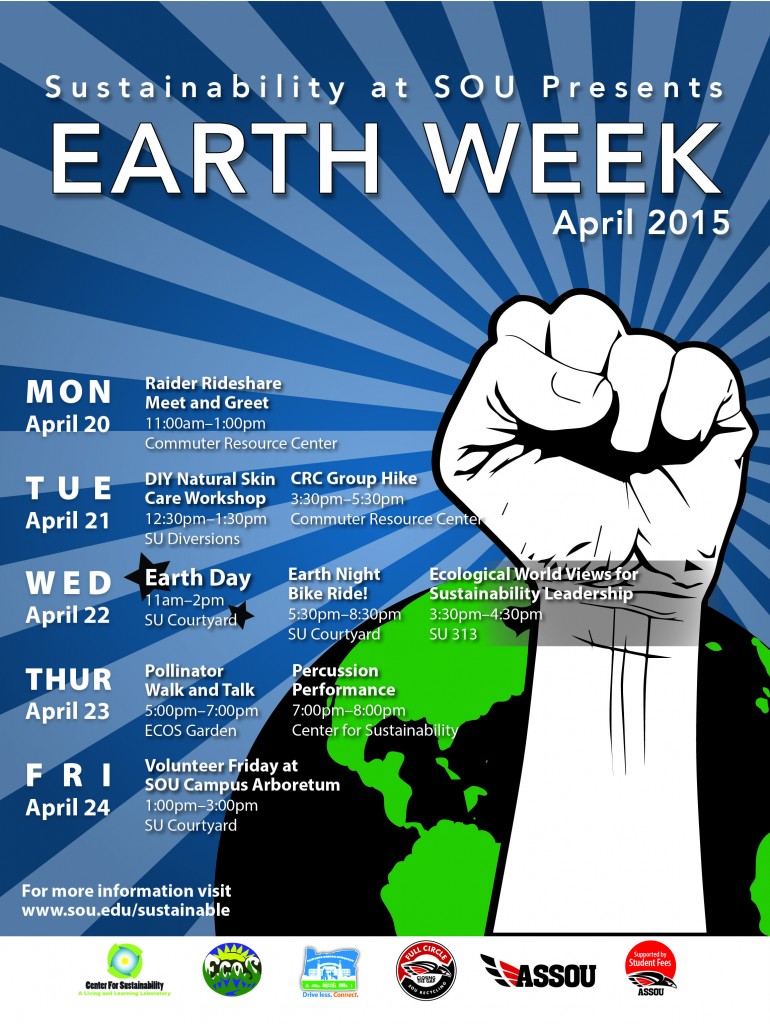In 1970, a society facing local, global, and economic distress founded Earth Day in an attempt to unite a divided population for a good cause: our planet. Thirty-five years later, and the event is still a regular part of campus and community tradition in a society, facing many of the same challenges.
“It’s a day to stop and appreciate the place we live. I always feel like I should go hiking or something,” says graduated SOU student Deanna Marano, enjoying the campus. “It’s really pretty amazing, and we should take better care of it.”
So, what did SOU do to help the environment this year?
Our campus celebrated Earth Day and its recent title as the nation’s first Bee Campus USA during the week of April 20th, with various demonstrations and activities highlighting the importance of pollinators and plants. Participants were educated on the importance of pollinator friendly gardens as featured around campus, and how student’s diets impact the environment with tips to change your daily behavior.
However for most students, SOU’s Earth Week is already in the rear view mirror, leaving one question remaining: how effective are these traditions are in supporting the cause, especially when considering the past and present state of the environment?
“I’m not on campus a lot so I couldn’t really plan for it,” says student Will Peterson
For students that aren’t on campus outside of classes, or missed the Earth Week events, it may seem as if their chance to make a difference has passed for the year. What can they do differently?
“It’s kind of something you have to work at every day,” Peterson says.
Sustainable SOU is offering activities every week on Friday’s throughout spring term including volunteer hours starting at 1:00pm at the campus community garden. Fortunately, part of attending a green university means making a change every day, sometimes without even trying.
SOU features a unique recycling system, with sorted cans located all around campus. There’s light switches in rooms that are rarely used to save power, such as the bathrooms in Central Hall, and dual sided printing abilities in the Hannon Library, Commuter Resource Center and other locations on campus to save paper when printing essays and articles.
Living an environmentally aware and considering everyday Earth Day may feel really difficult but consider that every bit helps. Thanks to PBS and Scientific American we mined for some simple solutions you can be a part of:
- Carry a reusable water bottle 6,000 single-use plastic water bottles are thrown away every four seconds in the U.S., and only roughly 20 percent are recycled. Carrying a personal water bottle that you can fill up with tap water can cut down on that and save you money.
- Unplug electronics after you’re done with them |Many of your electronics and appliances, like microwaves, televisions and cell phone chargers draw power from the plug even when you are not using them. Unplugging devices when they are not in use, or buying a smart power strip that will do this for you is a bright idea which also saves you on your electric bill.
- Replace old incandescent light bulbs with energy-saving compact fluorescents The EPA’s ENERGY STAR program, which identifies power-saving products says that replacing just one incandescent light bulb with a compact fluorescent will save $40 in energy costs over the lifetime of the bulb. Compact fluorescents use about 75 percent less energy, produce 75 percent less heat and last at least six times as long as standard bulbs.
- Bike to school or work According to BikesBelong.org, for every one mile on a bike instead of in a car, you can save one pound of CO2. And lose some pounds in the process–there’s a win/win!
- Plant a tree Planting a tree can help lessen pollution and provide shade to reduce urban “heat islands” that are harmful to human health. Over the course of a year, a single tree can absorb about 48 pounds of carbon, making them some of the cheapest and most effective means of reducing CO2, according to the Arbor Environmental Alliance.
- Consider eating less meat. According to a 2006 report by the United Nations Food and Agriculture Organization (FAO), our diets and, specifically, the meat in them cause more greenhouse gases: carbon dioxide (CO2), methane and nitrous oxide than either transportation or industry. (Greenhouse gases trap solar energy, thereby warming the earth’s surface. Because gases vary in greenhouse potency, every greenhouse gas is usually expressed as an amount of CO2 with the same global-warming potential.)




